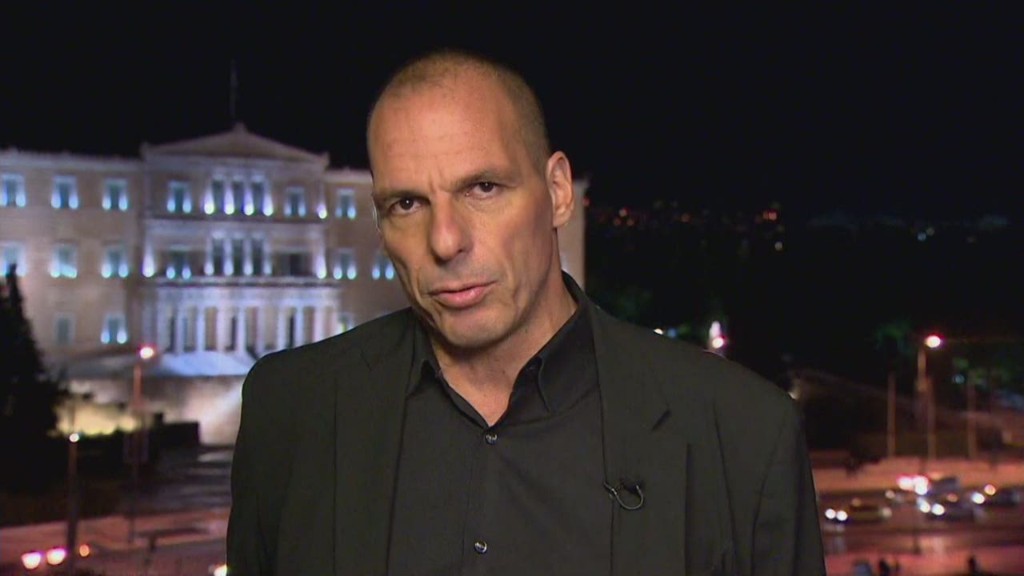
In less than four weeks the international lifeline that has kept Greece afloat for five years is due to expire. Debt repayments are looming and the country is running out of funds.
Lenders won't forgive Greece's huge debts so Prime Minister Alex Tsipras must negotiate a compromise, or put Greece's future in the eurozone at risk.
After a shaky start, his government has begun to suggest solutions. But the standoff with creditors is fueling uncertainty, shaking Greece's fragile banking system, and could tip the economy back into recession.
The uncertainty, along with any missteps by Greece's inexperienced leaders, could be enough to force its "accidental exit" from the eurozone.
It's an outcome neither side wants. Here are three landmines Greece has to dodge:
1. Debt deadlines
The first is debt. Greece needs more funds if it is to survive in the eurozone.
The bailout program -- which is worth about €240 billion ($272.5 billion) in international loans in exchange for structural reforms -- expires on February 28.
Related: Greek debt: Who has most to lose
So what happens if Greece hasn't reached a deal with its creditors by then?
First, it puts €7.2 billion in unpaid loans at risk, and Greece has bills to pay. There are 3 major deadlines, beginning with €1.5 billion owed to the IMF in March. Another €1.5 billion is due in June, and again in September, according to ratings agency Standard & Poor's.
There are also two bond repayments. Greece must pay back around €3.5 billion to the ECB and its eurozone partners in July. €3.2 billion is due in August.
S&P analyst Marko Mrsnik says Greece should have enough funds for the IMF payment due in March. But the bond payments that follow will be much more difficult to meet.
2. Falling government reserves
Greece's own coffers are emptying rapidly. The Greek government had €2.5 billion in cash reserves in September, according to the latest official data. Moody's analyst Alpona Banerji expects those funds to have declined significantly since then.
Government revenues are falling as the new anti-austerity government's promise of tax cuts encourages citizens to hold off paying their dues. And with 10-year bonds yielding more than 10%, tapping markets for more cash isn't an option.
Related: Syriza won. What's next for Greece?
The country's not bankrupt yet. The government is still targeting a primary surplus -- that means collecting more cash than it spends, before the cost of servicing its debts -- and could generate revenue from privatization receipts (although some sales may be postponed).
But it will likely need to tap nearly €18 billion in undisbursed loan commitments from the IMF and Europe, and for that it needs a deal.
3. Shaky banks
It's the banks that represent the biggest immediate threat to Greece's future. Money has been streaming out of Greece and its banks are at risk of a deeper run on deposits. Moody's says about €12 billion have already been withdrawn since early December. Shares in Piraeus Bank are down 33% this year.
For now, the banks are relying on ECB loans to fund their operations. But that could cease if Greece doesn't get a deal with creditors this month.
"The banks wouldn't have any funding facilities left," said Moody's Banerji. "It would also impact on the government's ability to repay and rollover its own debt."

The ECB could potentially provide emergency funds, a short-term lifeline used by Cyprus in 2013, but that too is unlikely without a longer term agreement on Greece's debt and economic reforms. There's also the Hellenic Financial Stability Fund - €11 billion available for bank recapitalization, which expires at the same time as the European bailout.
Short on cash and cut off from its creditors, Greece would be forced to start printing its own currency. And its time in the euro would be over.
"Whether or not the coalition in Athens can and will accept reality and strike a deal remains a very open question," said Berenberg economist Holger Schmieding, who puts the risk of an "accidental Grexit" at 35%.


